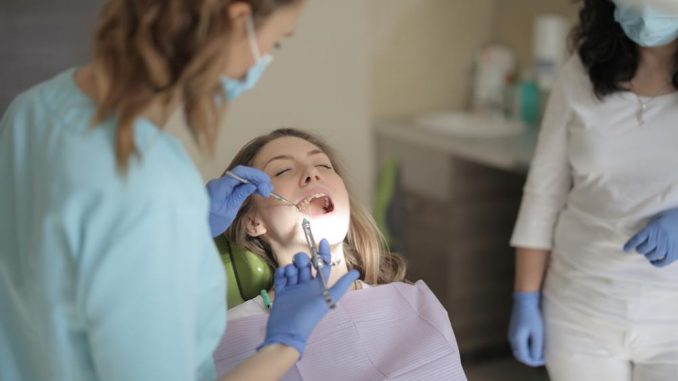
Oral health is something that everyone should prioritise. If you don’t look after your teeth, mouth, and gums properly, you run the risk of developing cavities, gum disease, and even oral cancer.
Oral inflammation and infection can also lead to a weakened immune system, contributing to a reduction in physical health and cognitive function.
There are many ways you can improve your oral health. Here are five of the most effective preventative measures to incorporate into your daily life.

1. Take a Healthier Diet
Eating a balanced, healthy diet is one of the most effective ways to improve your oral health. High-carbohydrate and sugary foods contribute to plaque building on the surface and around the roots of your teeth. This plaque leads to gum inflammation, decay, and causes tooth loss.
Try to moderate your intake of sweets which contains refined sugar that breaks down your teeth’s enamel. Also limit unhealthy, excessively starchy carbs, like crisps and white bread. And, eliminate soda and other carbonated drinks from your diet as they contain empty calories, are highly acidic, and are often laden with excess sugar.
Be wary of alcohol as well as it tends to dry out your mouth and reduce the amount of saliva produced, leaving you susceptible to tooth decay.
If you want to eat foods that promote oral health, choose:
- Healthy carbs, like fiber-rich vegetables and fruit that help fuel saliva production.
- Fluoridated food and drinks, like poultry, shellfish, and tea.
- Dairy products like cheese and plain Greek-style yoghurt as these contain calcium, which remineralises tooth enamel.
2. Drink Plenty of Water
Tap water often contains fluoride, which helps to promote oral health. Sodium fluoride helps to remineralise broken tooth enamel layers and strengthen their microhardness.
When you ingest fluoride, it moves into your saliva, where it comes into direct contact with your teeth’s enamel. The fluoride then combines chemically with your enamel’s calcium and phosphate, producing the highly resistive and durable mineral fluorapatite.
Drinking water also serves as a healthy alternative to soda and other flavored drinks which contain sugar that damages your teeth. If you want more advice on other beverages to avoid, contact your dentist in Camden Town and schedule a checkup and cleaning.
3. Upgrade Your Toothbrush
If your toothbrush is worn down or the bristles are splayed, it encourages you to brush more aggressively than normal, contributing to enamel deterioration. When purchasing a new toothbrush, look out for the following features:
- Soft Yet Firm Bristles
Opt for a soft-bristled brush with a small head as these can fit into and clean every part of your mouth, even wisdom teeth at the very back.
- Electronic Option
Research shows that electronic toothbrushes clean teeth more effectively than manual varieties. This may be because they use an automatic circular brushing motion that is optimal for plaque removal.
- Suitable Handle
An ergonomic handle allows for easier brushing and can offer better access to hard to reach areas of your mouth. Choose a brush with a non-slip grip and grooves for your fingers.
4. Floss and Brush Two Times in a Day
The simplest and most effective way to improve and maintain your oral health is daily brushing and flossing. Properly brushing your teeth ensures that you’re clearing away food debris, bacteria, and the layer of plaque that accumulates on the enamel after every meal or drink.
Ensure you hold your brush at a 45° angle away from your gums to remove plaque effectively from the gum line. Don’t forget to brush the back of your teeth, as well as your tongue and cheeks to eliminate bacterial growth.
Flossing also removes this bacterial debris, allowing you to clean the gaps between your teeth that you can’t always reach with a toothbrush.
5. Start by Brushing in the Back
People often forget about cleaning the molars and premolars at the back of their mouths, concentrating instead on the more noticeable front teeth. Missing out on your molars can cause decay, cavities, and bleeding gums.
Next time you brush your teeth, try starting with your back teeth and work your way forward to the front of your mouth. If you do that, you ensure you’re cleaning each tooth thoroughly and adequately.
Final Thoughts
When it comes to oral health, it’s essential to keep on top of your tooth-brushing habits and your diet. You should also pay regular visits to your dentist as they can accurately diagnose dental issues, and talk you through appropriate steps for improving your overall oral health.

Leave a Reply